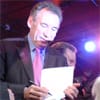From New York to Rome via London, the centrist candidate seems to be the one who catches the eye. Is it because his main rivals have been too conspicuous, or because they are not conspicuous enough? The question is raised, but the figures are there, clear and present, to make it understood to the leading figures of the next national election that they must count on a François firmly resolved to once again inscribe this first name in the history of the Republic. With 18%, 20%, and now credited with over 24% of voting intentions, candidate Bayrou is no longer the political scarecrow that the major parties pretended not to fear. The days when the UDF was just another party in a French political landscape where the National Front had carved out a share that has been crumbling day by day since the setback of 2002 seem far behind.
As early as December 10, 2006, our editorialist Jean-Luc Vannier, well before the rise of the centrist alternative, had sensed the “Bayrou” phenomenon (Editorial from December 10). Jean-Luc Vannier predicted, based on European examples: “Much to the chagrin of our French navel-gazing, a strange wind has been blowing from all over Europe toward France lately. And unlike the Chernobyl cloud, this one might not benignly stop at our borders. From Germany, from Austria, even from Czechia, coming from the Netherlands, it is preparing to infiltrate our territory. The political spirit of the ‘grand coalition’ is knocking at our door, ready to give the final assault during the next presidential and legislative elections.”
Magic formula or miracle recipe? Activists and sympathizers of the centrist party are more likely to speak of work and tenacity faced with a political class that has continuously portrayed their party as a camp without convictions, stuck between the perpetual right and left. But now, much like Zorro and without hurrying, the new François Bayrou has arrived to the great dismay of the heavyweights who find themselves forced to deal today with a candidacy that may have been underestimated by some.
The latest good news for the new François is the support from Corinne Lepage who, despite having the 500 signatures required to run for the election, prefers the candidate “who embodies a real change for the country.” Corinne Lepage had gathered 1.88% of the vote in the first round of the 2002 presidential election while poll institutes had so far credited her with 1% this year. Having evolved in Alain Juppé’s government, this lawyer by training is a timely reinforcement for the President of the UDF who hopes to achieve success.
A first element of response will fall on the evening of April 22, and this new factor will certainly have changed strategies in the other major French parties, which might have considered too soon the sole duo of Royal-Sarko. But, of course, the crucial date will remain May 6, 2007, which will bring a new leader, hopefully a statesman!


